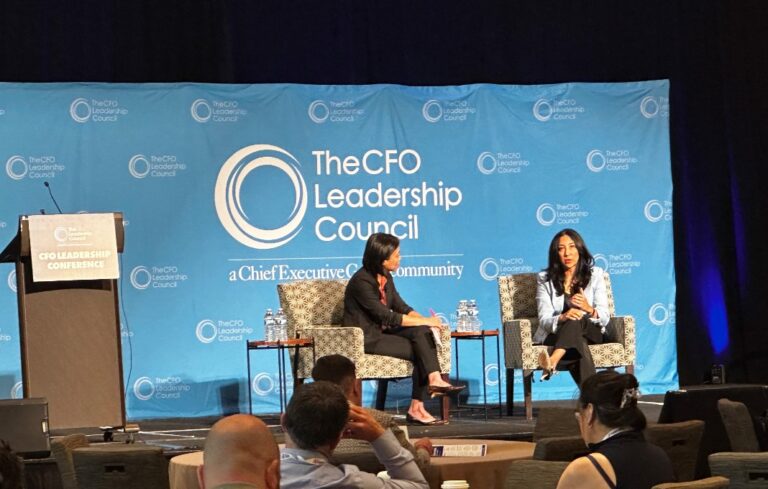Toast's Chief Financial Officer, Elena Gomez, joined the Boston-based company a few months before it was scheduled to go public. She had just five months to meet with investors, build relationships with the board, determine talent needs before the IPO and in the years after, and help develop a story and strategy for the restaurant automation provider that would stand the test of time.
In a keynote address at the CFO Leadership Council's spring conference in Boston on Wednesday, Gomez spoke about key moments and struggles before and after the $3.9 billion company went public, and what other CFOs can learn from her three years as chief financial officer.
For example, before going public, Gomez focused on two things. First, the importance of a team around the CFO. “Probably the most important thing I did was figure out what talent I had and what talent I was going to need over the next three to five years,” Gomez says. “And I'm so glad that most of that talent is still with me today.”
Gomez looks for finance team members who are intellectually curious: “That trust-and-verify mentality is really important” in FP&A, especially. But across finance, Gomez looks for leaders who can “fly high but also dig deep”—people who can interact with the board but also get their hands a little dirty.
Another key area where Gomez spent most of her time prior to the IPO was honing a company story and strategy that would stand the test of time. “We spent a lot of time thinking about whether this strategy was perfect,” Gomez said. “I still believe that the reason I joined Toast was not just to build a good company, but to build a generational company,” she said. “I would encourage any CFO taking a company public to spend a lot of time on strategy and story.”
Building a company that will last for more than a generation obviously requires financial discipline, especially once the company goes public.
At this stage in Toast's lifecycle, like many other organizations, there is a tension between quarterly profitability and growth goals. Gomez said Toast's focus is on investing organically and driving profitability in a disciplined way. “That will generate cash flow and give us the right to invest in new things,” she said. Toast has made international bets in English-speaking countries, investments that have very long payback periods or no payback periods at all.
When Toast began investing overseas, “there was real tension,” Gomez says. “Some people within the company probably wondered: Why not go into our core business in the U.S., where we only have 13% market share?” “At the end of the day, we want perpetual growth,” she says.
Gomez had three other key pieces of advice for other CFOs.
Don't hide from your decisions“I want to be on the front lines,” Gomez said, when discussing tough decisions like layoffs with employees. “If you show the right empathy in that moment, people remember it. They might not remember their coworker who got laid off, but they'll remember that the company handled it well,” Gomez said, adding that executives showed up and explained what happened.
Use your customers as anchors“If the CFO and the CEO don't see eye to eye, or if there's a disagreement among C-level executives, Toast is founded on 'solve the problem for the customer' – doing the right thing for the customer,” Gomez said. CEOs may have different ways of solving problems, but as long as the outcome is good for the customer, that's what matters. “The other thing is, if you're in a situation where you're really not seeing eye to eye, data can really clarify the issue,” Gomez said.
Building personal resilienceWhen asked what advice she would give to her younger self, Gomez shared two lessons she learned. First, “As a CFO, you're going to have dark days,” Gomez said. “You might have days when the stock doesn't move the way you expect it to, or you're having a hard time, and that's when people are going to look to you to be a tenacious leader. It's important to develop tenacity on your journey to the CFO role.” Second, Gomez advised young financial executives not to worry about knowing everything. “Early in my career, I think I worried too much about not knowing at all,” she said. “Now I don't know everything, and I'm totally comfortable with that.”

